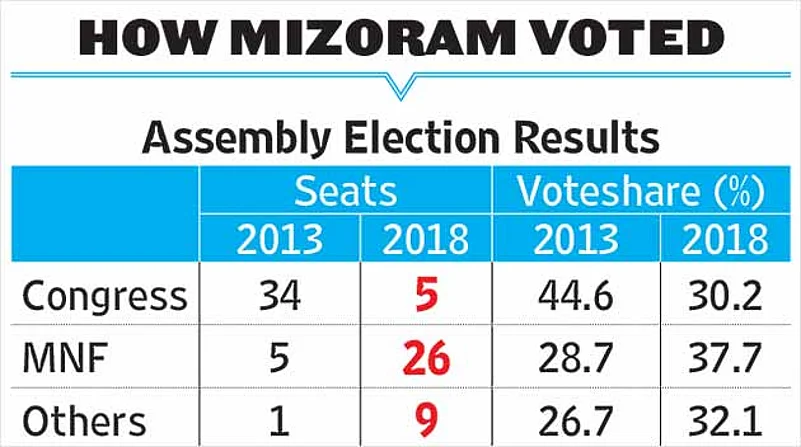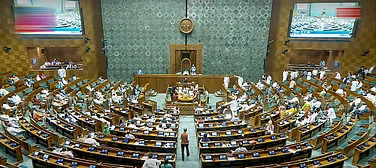The Congress is thrown out of power after two consecutive terms (2008-2018) in Mizoram. The Mizo National Front (MNF) which has been out of power since 2008 has come back with a majority of 26 seats. This election saw the BJP make its debut in the Mizoram assembly for the first time with one seat. The Zoram People’s Movement (ZPM), which is a conglomeration of six local political groups, has won eight seats; its chief ministerial candidate Lalduhoma winning in two constituencies. Smaller parties not having enough punch such as PRISM and Zoram Thar also contested.
A sense of anti-incumbency had been running high in the state for the past few years, but strangely the Congress leadership in the state seemed to have paid no heed. One often wonders how such complacent leadership could have evolved in a party with long experience in politics. In the 2013 election, Mizoram voters gave them, and in fact, for the first time for any party, a solid majority of 34 seats in the 40-seat assembly. Such a mandate should have ensured and strengthened the people’s faith in the party, but they were taken for granted and the voters did not like that.
There is another thing which seemed to have weakened the Mizoram Pradesh Congress Committee (MPCC), and that is the longstanding fight within the party which burst open just before election was announced; the home minister who was also the party’s vice president quit both posts and joined the MNF, and former health minister Lalrinliana Sailo followed suit to the MNF camp.

There’s no real progress in development. Roads linking the rest of Mizoram with capital Aizawl are in bad shape. The majority of voters live in districts outside Aizawl. For them, enduring the horrible roads day in and day out is good reason not to vote for the party they had ushered in with high hopes the previous election.Adding insult to injury, chief minister Lal Thanhawla said at a public meeting in Aizawl last year that Mizoram has the best roads in the Northeast.
Though anti-incumbency swelled, the Congress played deaf and mute. It failed to highlight its achievements like MIMER (the lone medical college in Mizoram), the Tuirial hydel project etc. It should be noted that Mizoram ranks among one of the highest on the developed state index of NITI Aayog.
Moreover, in a survey done by Lokniti in Mizoram in September this year, it was found that nearly half the households had benefited from health and agricultural schemes of the state government. All these feats could have been highlighted over the past year to blunt the anti-incumbency wave. The MNF, which won only five seats in 2013, took advantage of this and succeeded.
Another miscalculation, perhaps the most fatal, by the Lal Thanhawla administration is the sale of Indian Made Foreign Liquor (IMFL) in the state by implementing the Mizoram Liquor Prohibition and Control Act (MLPC) since 2015. The church is much against it. The MNF in its campaign promised the people it would end the sale of alcohol and impose total prohibition again in the state.
Voters gave the MNF and Congress two consecutive terms each (MNF 1998-2008). With the Congress failing the people, the MNF has returned with a majority. One hopes at least an iota of the rural people’s aspirations will be met and basic amenities for them will be provided. It is important to note that one of the key reasons for the Congress’s loss is the voteshare of ZPM, which has attracted the floating voters of 2008 and 2013 elections. The eighth Mizoram assembly will be, however, interesting, considering the fact that the Opposition will be a force to reckon with in comparison with the previous House.
(The writers, Lallianchhunga and Ezrela Dalidia Fanai, are Lokniti’s state coordinator and supervisor in Mizoram, respectively)





















